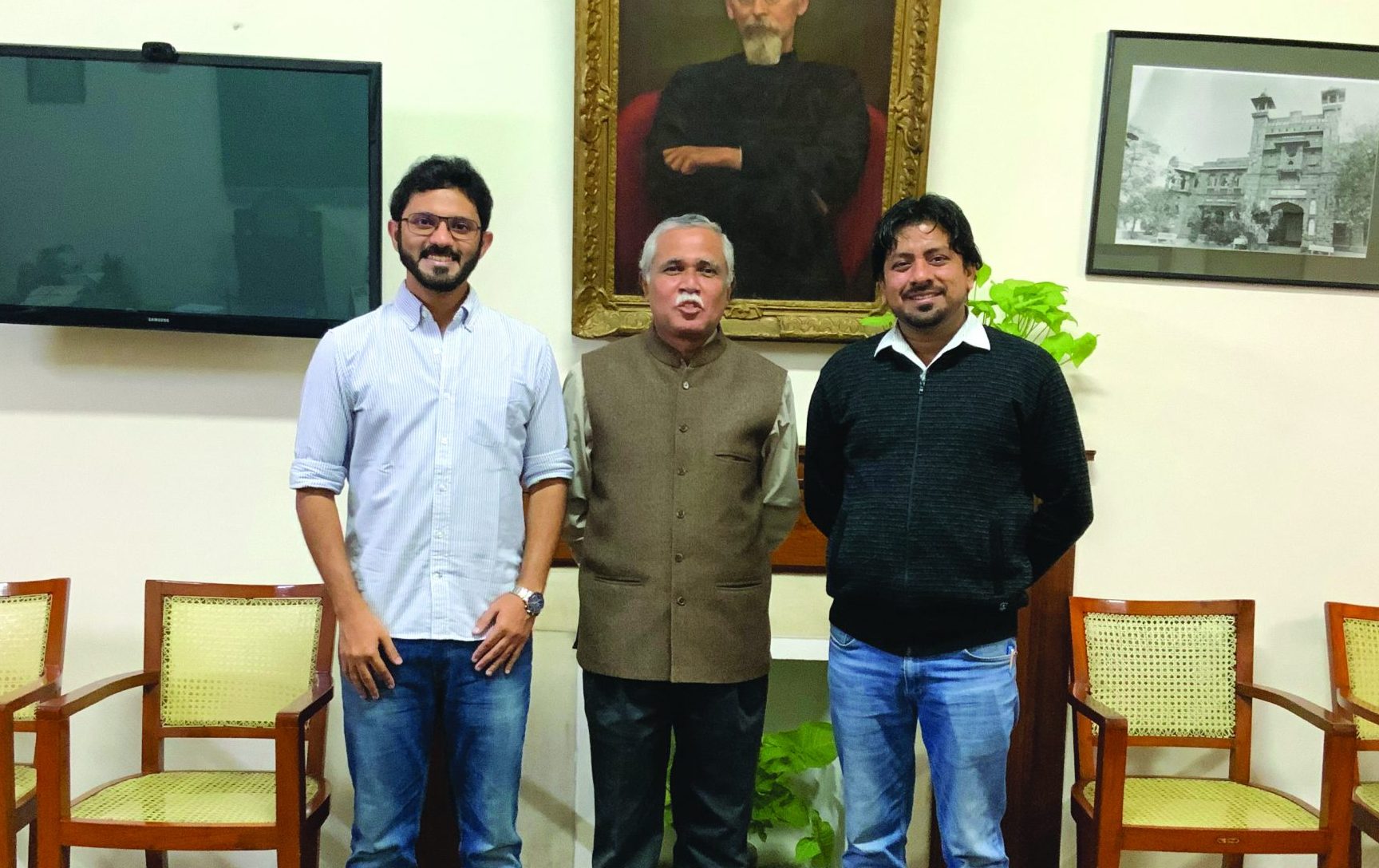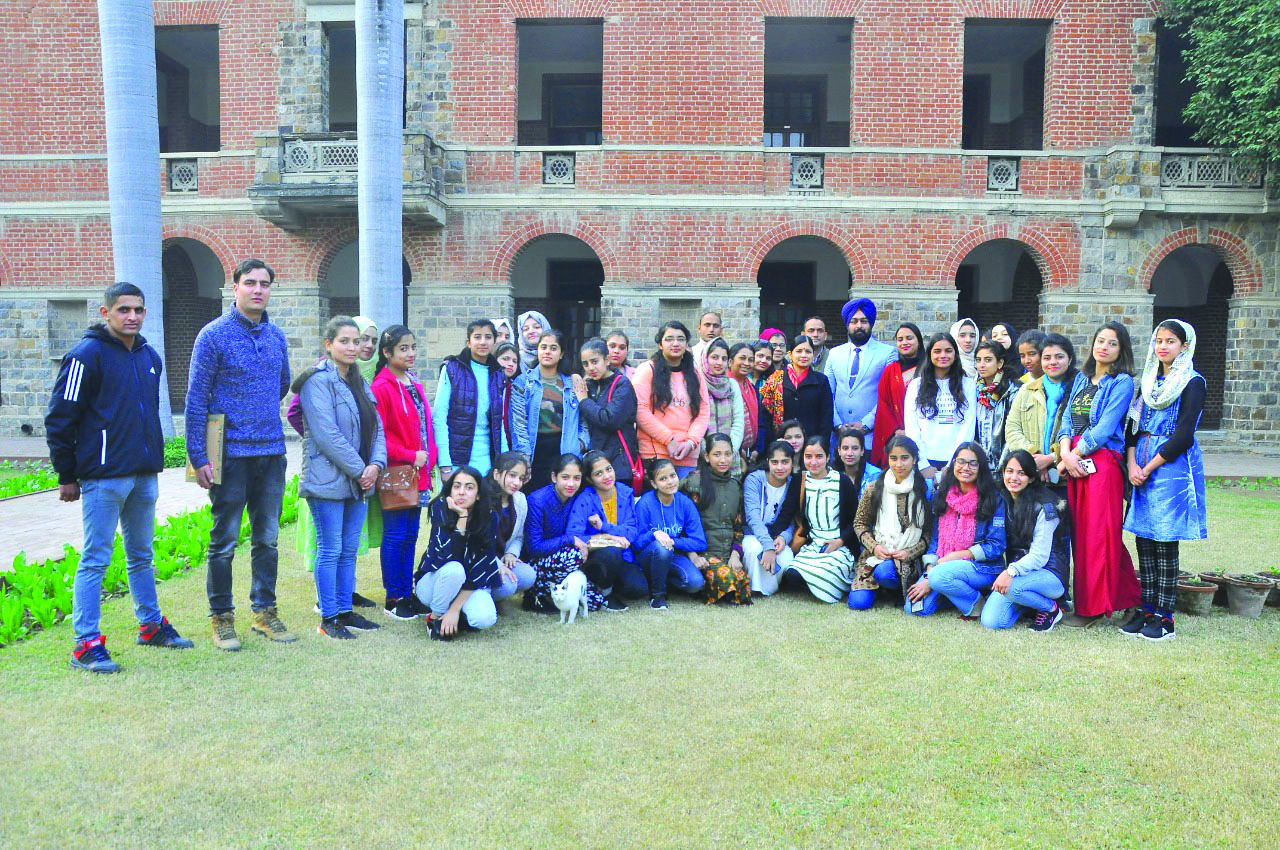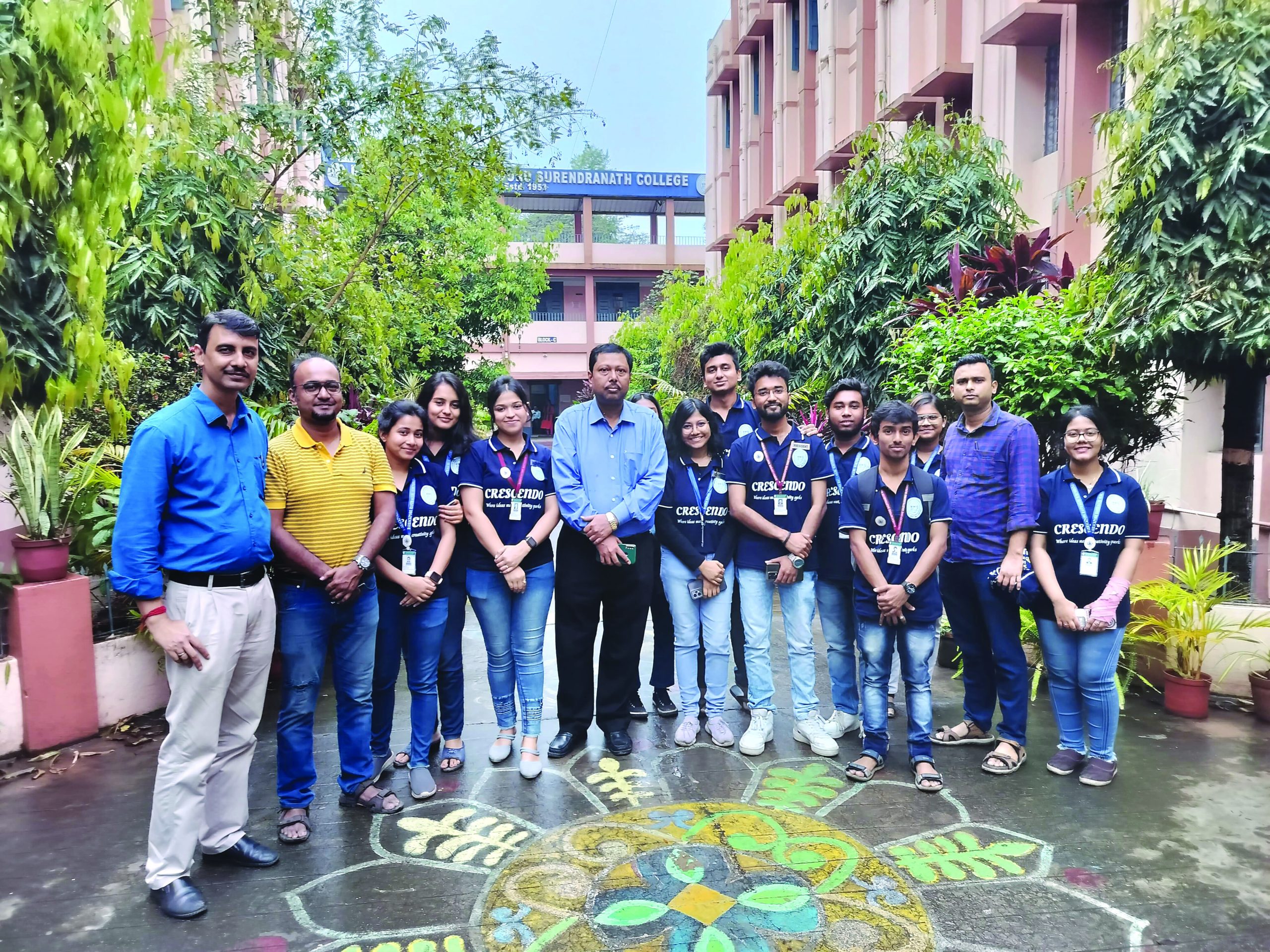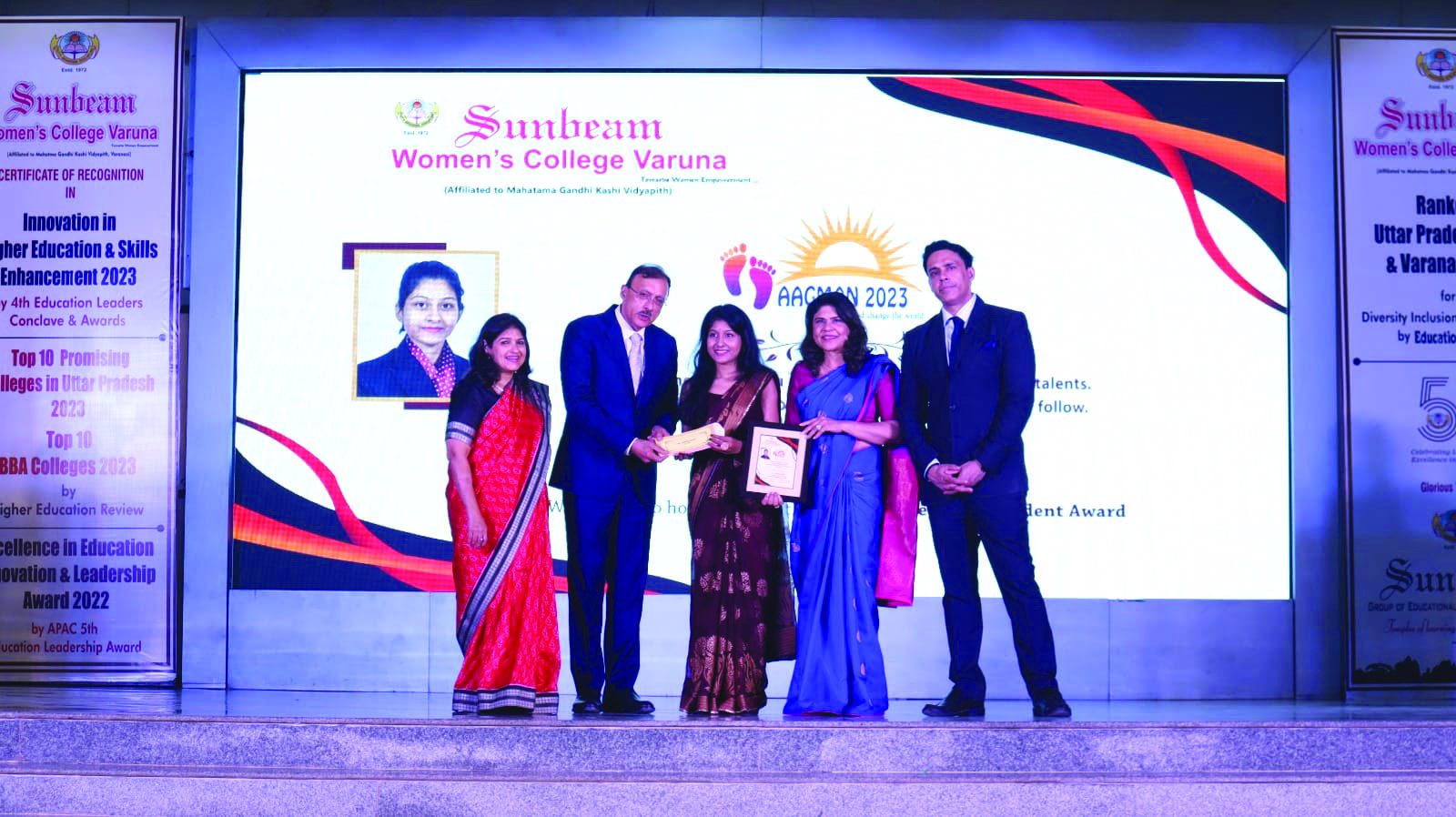In this year’s private non-autonomous colleges league table, St. Stephen’s College, tied to the apron strings of Delhi University — a Central government institution — retains its #1 status. Several nationally acclaimed Arts, Science and Commerce (ASC) undergrad colleges are in the same boat

St. Stephen’s Prof. John Varghese (centre): service commitment
Like God, government moves in mysterious ways. Any well-educated and well-informed individual will readily concede that St. Stephen’s College, Delhi (estb.1881) is by far and away India’s most admired/best Arts, Science and Commerce (ASC) undergrad college countrywide. Certainly the several thousand sample respondents drawn from academia, industry and students communities interviewed for the annual EducationWorld India Higher Education Rankings (EWIHER) year after year seem to think so. Ab initio since the annual EWIHER was introduced in 2013, St. Stephen’s has been voted India’s #1 ASC college.
Since 2020 when ASC colleges were divided by your editors into Private Autonomous, Government Autonomous and Private Non-autonomous categories for ranking purposes (to eliminate apples with oranges type comparisons), St. Stephen’s has consolidated its numero uno position in the EW national league table of Private ASC Non-autonomous colleges.
However in the NIRF (National Institutional Ranking Framework) 2024 of the Union education ministry, St. Stephen’s is ranked a modest #14. That’s the mystery. Last year on this very page your editors had speculated why St. Stephen’s has not been awarded autonomous status for which it applied five years ago. Even though the National Education Policy (NEP) 2020 explicitly recommends that excellent colleges should be awarded autonomy and encouraged to transform into degree awarding universities in their own right.
At that time drawing on information derived from the academia grapevine, we opined that the neta-babu brotherhood which has controlled and commanded Indian education — especially higher education — with iron grip, is reluctant to surrender its powers of control and patronage over India’s finest higher education institutions that provide excellent learning at heavily subsidized tuition (and residential accommodation) prices. Under the status quo their powers of patronage are massive.
Unsurprisingly there is no change in St. Stephen’s official status and it continues to remain a Private Non-autonomous college tied to the apron strings of Delhi University — a Central government funded institution. Several nationally acclaimed ASC undergrad colleges such as Miranda House, Sri Ram College of Commerce, Lady Shri Ram College, Hindu College, Sri Ventakaswara College — all affiliated with Delhi University — are in the same boat.

Graduating students at Miranda House with principal Dr. Bijayalaxmi Nanda (centre)
Indeed of the country’s Top 10 private non-autonomous ASC colleges, eight are affiliated with Delhi University, indicative of the heavy subsidization of the varsity by the Central government. In the Union budget 2024-25, Rs.15,928 crore has been allocated for Central government universities (apart from IITs and NITs). An estimated 30 percent of this amount is for Delhi University (DU) and its constituent colleges where tuition fees are less than half paid by college students in neighbouring China. For several years EducationWorld has been advocating means-tested, targeted — instead of universally subsidised — tuition fees in higher education which would increase the income flow of affiliated colleges under the tuition fees head and free greater resources for public primary/secondary education. Alas, to no avail.
Be that as it may, despite not being granted autonomous status, for Prof. John Varghese, principal of St. Stephen’s College, this vintage institution ranked the country’s #1 ASC college, is comparable with the best globally. Varghese is especially pleased that EW sample respondents have awarded highest scores under the parameters of faculty welfare and development and faculty competence which he believes is the prime cause of St. Stephen’s excellent reputation among the cognoscenti.
“Our highly-qualified faculty and non-teaching staff are committed to every student getting the best undergrad education. They put their work before their personal interest which inspires our students to also put in their best effort. This is what adds up to make St. Stephen’s #1,” says Varghese.
According to Varghese, the success secret of this 143-year-old college is its institutional legacy of “service towards the country” envisioned by its founding fathers. “We encourage young men and women who enter our portals to study well and with purpose. And that purpose is neither (acquiring) a degree nor financial reward, or recognition. It is service to the country and the world. That’s why our graduates shine in every area of human endeavour — the arts, business, NGOs, bureaucracy, education, you name it. Someone from St. Stephen’s is making a positive difference somewhere. Spirit of service, that’s the key,” says Varghese, an alum of Loyola College, Chennai and English and Foreign Languages University, Hyderabad who was appointed principal of St. Stephen’s in 2016. Currently, this college has 1,247 students mentored by 86 faculty on its muster rolls.
Although Dr. Bhagyalaksmi Nanda, an alumna of Utkal (Odisha), Delhi and JNU universities and principal of Miranda House, Delhi (MH, estb. 1948), the well-reputed women’s college which is routinely top-ranked in the annual NIRF of the Union education ministry, is presumably disappointed that MH is ranked #4 in the latest EW league table of India’s top-ranked ASC non-autonomous colleges, she graciously derives comfort from its promotion from #5 in 2023-24.
Without rancour, she rationalizes MH’s top rank in NIRF 2023 to the college’s high priority to “outreach, and student diversity and inclusivity” and wide range of study programmes — parameters which are given high weightage in the NIRF rankings. “Whereas NIRF is based on empirical data, the EW survey is based on public perception which places our low-profile college at a disadvantage,” explains Dr. Nanda.
Nevertheless Nanda derives considerable satisfaction from MH’s top score (tied with St. Stephen’s) under the parameter of graduate placements. “We have a very active placements cell on our campus which is supplemented by word-of-mouth publicity given to MH by alumni who have had a good learning experience here. This is a very satisfying endorsement of the good work our faculty is doing,” says Dr. Nanda who signed with MH in 1993 and was appointed principal in 2022. Currently this highly-reputed ASC undergrad college has 5,600 women students mentored by 240 faculty on its rolls.
So great is the dominance of colleges affiliated with Delhi University in the EW 2024-25 Top 10 league table of private non-autonomous colleges, that the sole non-Delhi college on top table is the Barrackpore Rastraguru Surendranath College (BRSC), Kolkata, ranked #9 nationally and #1 in West Bengal. Jesus & Mary College, Delhi is ranked #10.

BRSC, Kolkata’s Monojit Ray (centre): sole non-Delhi college in Top 10
Dr. (Prof.) Monojit Ray, Principal and Controller of Examinations at BRSC, which hosts 5,600 students mentored by 148 faculty, is exhilarated that BRSC is ranked among India’s Top 10 non-autonomous ASC colleges, #1 in West Bengal and also because it has been promoted to #9 (10).
“Credit for our progress and in particular retention of our #1 rank in West Bengal has to accrue not only to our faculty, but also to our students who are well-disciplined and focused on their studies and advancement. I am especially pleased with our good scores under the parameters of faculty welfare and development and infrastructure. We prize our faculty and provide them every opportunity to develop their professional skills and training. With the full co-operation of students, BRSC maintains two scenic campuses — an admin and science campus in Barrackpore Cantonment and a Riverside arts and science campus which is routinely awarded prizes and certificates for its flora, if not fauna. Our intent is to provide excellent academic qualifications to our students, and also impart an all-round development experience that will transform them into good citizens,” says Ray, an alum of the Ramakrishna Mission Vivekananda Central College and Western Calcutta University who served a long stint as faculty with the Navdeep Vidya Sagar College, Kolkata (1999-2016) prior to being appointed principal of BSRC.
Beyond the Top 10 and within the Top 20, the status quo has been largely maintained in the EW league table 2024-25 of India’s 126 most reputed private non-autonomous colleges. The sole exception is the Arya Mahila PG College, Varanasi promoted to #20 (21). But beyond the Top 20, some colleges have risen handsomely in the esteem of EW sample respondents.

Sunbeam, Varuna’s directors Deepak (centre left) & Bharti Madhok (centre right)
For instance Sunbeam Women’s College, Varuna, Varanasi is promoted to #35 (50) and SSG Pareek PG College from #49 in 2023-24 to #37 this year. The previously unranked M.L. Dhanukar College of Commerce, Mumbai has debuted at #40 and Shree Damodar College of Commerce & Economics, Margao (Goa) is promoted to #48 (53).
As usual we are obliged to end with the caveat that the national league table of ASC non-autonomous colleges is of limited value to day scholars and school-leavers who prefer not to venture further afield for undergrad study. For such students state rankings are of greater import.
They need to bear in mind that colleges modestly ranked in the national league table are often heavyweights in their host states. For instance Kamala Nehru College for Women ranked India #18 is the #1 ASC non-autonomous college in Punjab (pop. 31 million). Sunbeam Women’s College, Varuna, Varanasi, ranked #35 nationally is the #1 ASC undergrad college in Uttar Pradesh (pop. 215 million) and SSG Pareek PG College, Jaipur India #37 is numero uno in Rajasthan (pop.83 million).




























